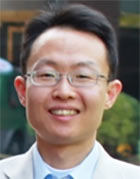Dec
14

Date: 14 December 2023
Time: 9:00 AM-1:00 PM ET (New York Time)
Presenter(s): Dr. Ming Ding
Abstract
Federated learning (FL) is gaining popularity as a decentralized machine learning method. It safeguards client data from direct exposure to external threats. However, attackers can still steal information from shared FL models. To address this, we've created a privacy-preserving FL framework using differential privacy (DP). Additionally, we establish a convergence upper-bound for the proposed DP-FL framework, revealing the existence of an optimal number of communication rounds for best convergence with privacy protection.
Biography
 Dr. Ming Ding (IEEE M’12-SM’17) received the B.S. (with first-class Hons.) and M.S. degrees in electronics engineering from Shanghai Jiao Tong University (SJTU), Shanghai, China, and the Doctor of Philosophy (Ph.D.) degree in signal and information processing from SJTU, in 2004, 2007, and 2011, respectively. He is currently a Principal Research Scientist at Data61, CSIRO, in Sydney, NSW, Australia. From April 2007 to September 2014, he worked at Sharp Laboratories of China in Shanghai, China as a Researcher/Senior Researcher/Principal Researcher. His research interests include data privacy and security, machine learning and AI, and information technology.
Dr. Ming Ding (IEEE M’12-SM’17) received the B.S. (with first-class Hons.) and M.S. degrees in electronics engineering from Shanghai Jiao Tong University (SJTU), Shanghai, China, and the Doctor of Philosophy (Ph.D.) degree in signal and information processing from SJTU, in 2004, 2007, and 2011, respectively. He is currently a Principal Research Scientist at Data61, CSIRO, in Sydney, NSW, Australia. From April 2007 to September 2014, he worked at Sharp Laboratories of China in Shanghai, China as a Researcher/Senior Researcher/Principal Researcher. His research interests include data privacy and security, machine learning and AI, and information technology.
Dr. Ding has co-authored more than 200 papers in IEEE journals and conferences, all in recognized venues, and around 20 3GPP standardization contributions, as well as 2 books, i.e., “Multi-point Cooperative Communication Systems: Theory and Applications” (Springer, 2013) and “Fundamentals of Ultra-Dense Wireless Networks” (Cambridge University Press, 2022). He also holds 21 US patents and has co-invented another 100+ patents on 4G/5G technologies. Currently, he is an editor of IEEE Communications Surveys and Tutorials. Besides, he has served as a guest editor/co-chair/co-tutor/TPC member for multiple IEEE top-tier journals/conferences and received several awards for his research work and professional services, including the prestigious IEEE Signal Processing Society Best Paper Award in 2022.
